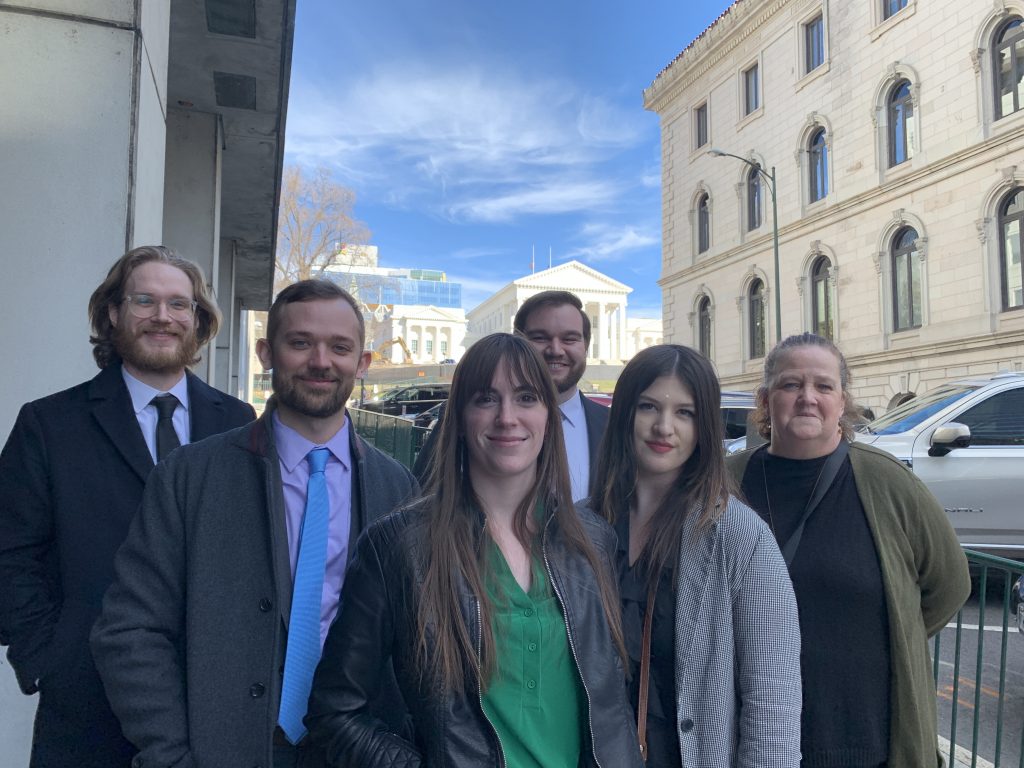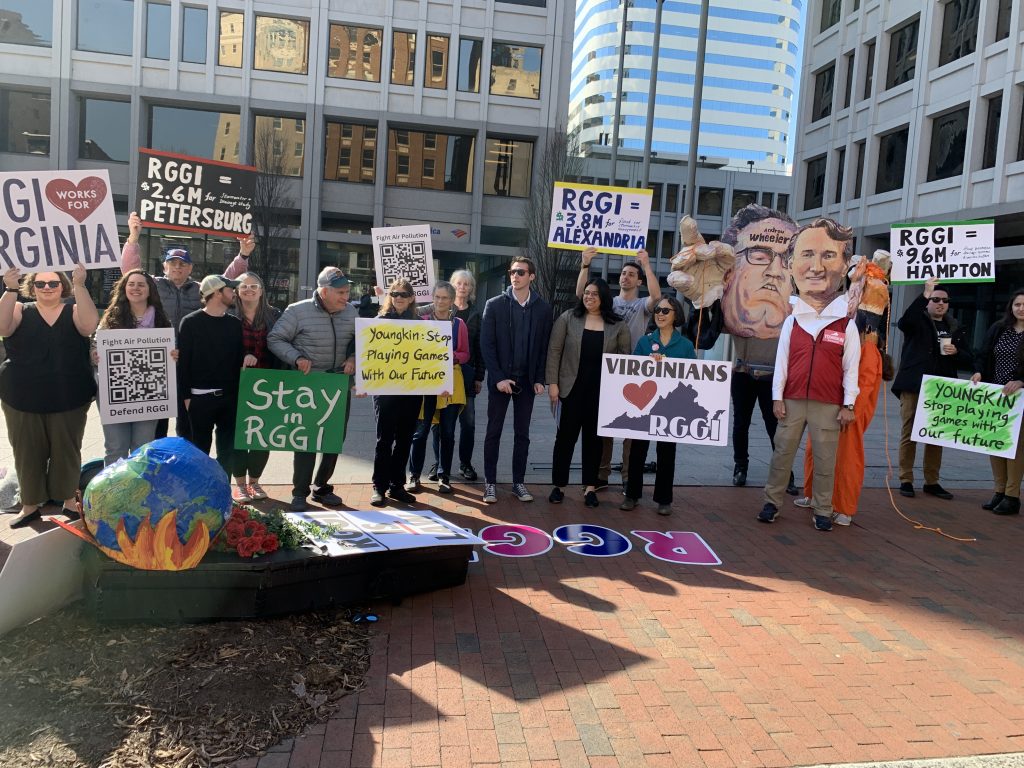Front Porch Blog

The Virginia Capitol. Photo by J.M. Davidson
The 2023 Virginia General Assembly session that concluded last week was a short session. With Democrats in charge of the Senate and Republicans in control of the House (and the governor’s office), any substantive legislation needed bipartisan support for passage. This led to the defeat of many promising bills — but we also saw some impactful wins!
Even with the short session, Appalachian Voices’ capitol team had a lot to keep track of, with a number of bills we were hoping to convince legislators to support — and quite a few we were hoping to convince them to vote down.
Here’s a roundup of some of the key energy and environmental legislation we tracked and how it fared.

From left to right: Peter Anderson, Will Cleveland of Southern Environmental Law Center, Del. Sally Hudson, Del. Lee Ware, Del. Rip Sullivan, former Sen. Jennifer McClellan, Brennan Gilmore of Clean Virginia, Dana Wiggins of Virginia Poverty Law Center, Dan Holmes of Clean Virginia and former Del. Albert Pollard celebrate passage of the Affordable Energy Act. Photo by Jen Lawhorne
Utility reform
The General Assembly devoted much of the session to consideration of two diametrically opposed pieces of legislation: the Affordable Energy Act, which would restore the State Corporation Commission’s authority to truly regulate the rates that Dominion Energy and Appalachian Power charge customers, and HB 1770/ SB 1265, a bill written by Dominion for Dominion.
The Affordable Energy Act empowers the SCC to lower electricity rates if customers are being overcharged. This legislation was needed because various other policies enacted over the past 15 years have allowed Dominion and Appalachian Power to overcharge customers by approximately $2 billion. By contrast, earlier versions of Dominion’s bill would have restricted the SCC’s regulatory authority further, increasing Dominion’s profit margin by statute.
Thanks to the work of the bill patrons — along with strong advocacy from stakeholder groups and people like you — the Affordable Energy Act passed both houses unanimously. Meanwhile, consumer protection became contagious, with Gov. Glenn Youngkin and the Office of the Attorney General leading negotiations with the House and Senate on Dominion’s bill, and a strong bipartisan compromise came together. On balance, the compromise bill is a win for Dominion’s customers. While Dominion will receive a two-year increase to its profit margin, customer bills will still likely decrease with the elimination of a number of surcharges. The compromise bill also adds the Affordable Energy Act language, and starting in 2025, the SCC will regain full authority to regulate the monopoly’s rates, preventing overcharges and potentially leading to even lower bills in the future.

Read Emily Piontek’s November 2022 report about how Virginia’s current shutoff policies for electric, gas, and water utilities do not meet widely accepted and recommended industry best practices, even in critical life-or-death situations.
Utility shutoff protections
With divided government, and in an election year where every seat in the General Assembly will be up for grabs, some partisan bickering was unavoidable. Unfortunately, some of that bickering led to the defeat of good legislation that had broad bipartisan support.
Among the casualties were bills designed to protect vulnerable consumers from having their power and other utilities shut off for nonpayment during extreme weather, public health emergencies and other critical situations. The need for this kind of protection became obvious in 2020 when — near the start of the pandemic — people who could not afford their bills were being disconnected from essential utilities like water, despite strong public health reasons for people to stay in their homes and be able to wash their hands. Virginia is one of only seven states that does not have a policy protecting customers from disconnection during temperature extremes.
The campaign for these protections built on a 2022 review of shutoff policies published by the SCC that included recommendations that were included in this legislation. The House bill was tabled by a House Commerce and Energy subcommittee, in spite of the fact that it received no opposition from stakeholders. The Senate companion bill made it a bit further — passing the Senate with a hefty, bipartisan margin, only to be killed by the same House subcommittee.

The Southwest Virginia New Economy Network shared solar lobbying team, from left to right, John Steele. Robert Kell, Emma Kelly, Dustin Keith, Rose Noe and Roberta Thacker-Oliver. Photo by Jen Lawhorne
Solar legislation
Bills to improve Dominion’s shared solar program and expand shared solar to Appalachian Power and Old Dominion Power customers also fell victim to partisan repercussions. Shared solar programs allow customers to buy power from local, small-scale solar systems. This shouldn’t be controversial or complicated, but, in Virginia, it is. A 2020 bill allowed Dominion customers to subscribe to shared solar programs and gave the SCC authority to set a minimum bill that participating customers would still pay to Dominion.
Unfortunately, the SCC decided last year to implement a minimum bill that is so high that shared solar programs won’t work. Accordingly, Appalachian Voices and our allies supported legislation that would lower the minimum bill and allow expansion of the program to Old Dominion and Appalachian Power customers. These bills also passed the Senate but did not make it through the House Commerce and Energy committee.
Nuclear energy
Several bills introduced this session supported Gov. Youngkin’s push for small modular nuclear reactor development. One bill would have created a “pilot” program allowing Dominion Energy and Appalachian Power to apply for approval of several new reactors, with the utilities’ customers bearing all of the development costs, whether or not the reactors ever came online. Thankfully, that bill was defeated.
While so-called advanced nuclear reactors carry the promise of reliable, carbon-free electricity generation, there is not a single SMR that has proven to be commercially viable, and the cost curves are bending in the wrong direction. Utilities should not be allowed to force their captive customers to assume all the risk for experiments with this unproven and costly new technology.
Other bills would have changed what types of energy are considered renewable. They would have added fuel sources like hydrogen, nuclear and methane produced from coal mines to Virginia’s list. The conservation community opposed these bills because the Virginia Clean Economy Act already has a carveout for nuclear. In addition, almost all hydrogen produced today comes from natural gas, and of course the combustion of methane is neither clean nor renewable. These bills were either heavily amended or defeated.
However, one bill that did pass establishes the Virginia Power Innovation Fund. The bill establishes the Virginia Power Innovation Fund and Program at Virginia Energy for the purposes of research and development of innovative energy technologies, including nuclear, hydrogen, carbon capture and utilization, and energy storage. The bill also creates a Virginia nuclear innovation hub in collaboration with the Virginia Nuclear Energy Consortium. Because the General Assembly has not yet agreed on a budget, it is unclear whether this program will actually be funded.

Supporters of keeping Virginia in the Regional Greenhouse Gas Initiative gather near the headquarters of Virginia’s Department of Environmental Quality on Jan. 30. Photo by Jen Lawhorne
Climate change
In 2020, Virginia passed major climate legislation, including bills that would lead to reduced carbon emissions and mandate the shift to a clean-energy economy. As in 2022, there were concerted efforts by fossil fuel interest groups to roll back that legislation this year, including an attempt to pull Virginia out of the Regional Greenhouse Gas Initiative — which caps carbon pollution from power plants and has provided hundreds of millions of dollars in funding for energy efficiency and flood protection for communities.
That attempt failed in the Senate, but administrative efforts to repeal Virginia’s involvement in RGGI are ongoing. Click here to sign up for a public hearing or submit a public comment to voice your opposition to removing Virginia from RGGI!
Metals mining
In late 2022, the National Academies of Sciences, Engineering and Medicine and a state committee each released reports detailing the potential threats posed by large-scale gold mining in Virginia. Both reports found that Virginia’s current regulatory system is not adequate to protect residents, our communities or our environment from the impacts of large-scale gold mining, such as water pollution.
The reports cited the use of cyanide in processing gold as a major concern. This inspired HB 1722, a bill that would have prohibited the use of cyanide and cyanide compounds in mineral mining operations. The bill found bipartisan support as it passed subcommittee and committee in the House of Delegates.
Unfortunately, HB 1722 died on the House floor. Concerns related to large-scale gold mining operations and the potential impacts to our public health, drinking water and environment from this industry will continue to be a focus of the work of Appalachian Voices.
Not quite finished
Most of the General Assembly’s business was concluded at the end of the session, but legislators left town without completing a budget, so that process will continue. We’ll be keeping an eye on the budget compromise in hopes that the Brightfields Fund receives money.
While this year’s General Assembly session was short, it was jam-packed! We’re sincerely grateful for all of the Virginians who took part. Whether you joined us in Richmond for a lobby day, told your friends and family about these issues, or sent letters to your legislators, thank you for speaking out!
When preparations for next year’s legislative session begin, you can count on us to continue advocating for policies that advance a swift and affordable clean energy transition. We look forward to advancing this work together.
PREVIOUS
NEXT
Related News

Leave a comment
Your email address will not be published. Required fields are marked *

Hi Pam! Thanks for mentioning these important bills. Our efforts were focused on the energy and environmental legislation outlined above. Virginia is fortunate to have a number of conservation groups working to ensure all important environmental issues have representation.
I’m disappointed that Appalachian Voices ignored the efforts by a few delegates and supporters at the GA to promote native plants and to work towards stopping the spread of invasives. Specifically, HB 2096 and HB 1998 were huge victories. Check out the Northern Virginia Audubon Society newsletter about this.